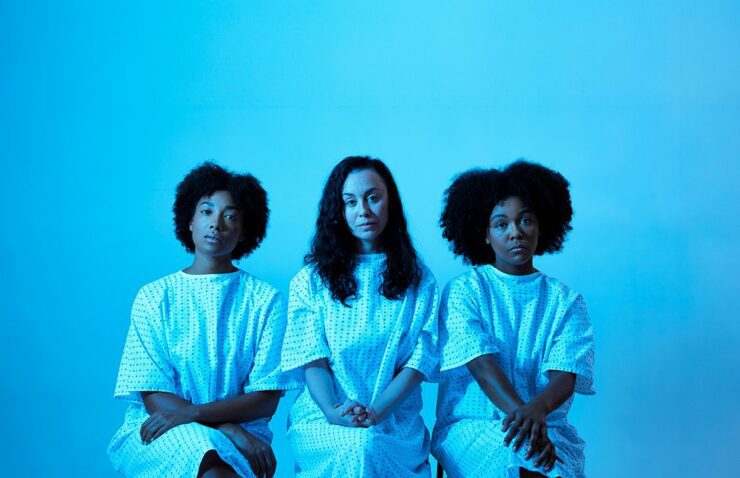So many times we are exposed to stories of the lead up to an event, the difficult decisions that place us here, the arguments, the suspense of not knowing what’s to happen. Afterwards is an exploration of everything that takes place just after all of that, the release of emotion, a real human look at the bit people skip past.
There is no preamble into this show as we are straight in with the story. Set in the recovery ward of an abortion clinic in the UK, three women are in the immediate aftermath of a life changing choice. Each of the women come from different walks of life. Two Irish women: one a young 18 year old girl, the other a married mother to three boys as well as an English solicitor try to tackle and rectify with their decisions
The set is grand with three hospital beds that fill the stage, a projection plays to give a larger sense of the outside world, a reminder of their being an outside world existing outside of this room. For all intents and purpose this feels like a professional show rather than a fringe show and our expectations are raised from the beginning as a result.
For obvious reasons movement in this show is limited and the women spend a lot of time in the beds. Therefore the success of this play is heavily reliant on the strength of the performances and how well the script is written. The acting and connection between each of the women not only to their own stories but how they interact with one another whilst with a limited ability to move around the space is incredible.
I was engaged throughout, never drifting in my focus despite being met with heavy text. The actors are able to bounce off one another, with quick wit and ease – never failing to hold the room in the times of joy or even in the heavier moments.
Theres an intelligence to the script that it’s both able to put abortion on an individual case level but also explore the wider context, highlighting culturally both the UK and Ireland. Abortion was made legal relatively recently within Ireland after the successful campaign of repeal the eighth but even with that particular fight being won.
Afterwards highlights the struggle that still women face on a daily basis on a social and personal level that meant that England is a more desirable option for getting this procedure done for some. It also makes us equally aware that abortion is not a given right in the UK and that the reason it can be done is based on a legal technicality rather than the belief of bodily autonomy.
This is a show that really speaks to it’s audience and it almost feels like an individual experience rather than watching with a collective. We have moments where it feels like we’re being checked in on perfectly in tune with it’s audience – I think it does a really good job of boiling down the heavy topics that surround the necessity of abortion in a way that’s digestible for your average theatre goer. Arguments about abortion, its right to exist, are always presented with a focus on empathy and humanity at its forefront. We explore opposing opinions from a place of curiosity rather than abrasion and for this play it works well.
My only feeling is that at times the opportunities that arise for these conversations to exist happen a little too conveniently and I think some more nuance in how these conversations come about could be investigated a bit further. Regardless when the topics do arise they are handled well with what I think is the right level of being uncomfortable as an audience member. A reminder that theatre should challenge opinions and that sometimes being uncomfortable isn’t always a bad thing.
When the show finished it was met with a sea of standing ovations almost immediately. It’s importance and relevance shining through touching every person in that theatre – I think that speaks more volume than I ever could.
Recommended drink: Hospital grade squash.
Performances of Afterwards have now concluded at Dublin Fringe 2024.
Hear the latest from Marginalised Voices from Fringes across the World
Subscribe to our Email Newsletter so we can send you insightful updates about unheard creative voices working to platform powerful stories. You'll be the first to hear about our content and how to apply to have shows you're working on reviewed.
Powered by EmailOctopus









